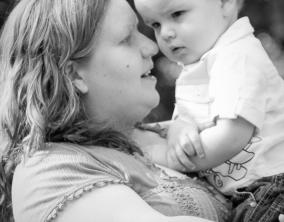Poland Syndrome diagnosis is often a difficult journey for lots of parents and individuals. Even though Poland Syndrome is something you are born with getting the right diagnosis can be tricky. As it is rare there are many medical professionals who do not know what Poland Syndrome is and therefore do not recognise the visible symptoms.
“My gorgeous son was born with Poland Syndrome in 2008 and he is my angel. We had a difficult birth and spent quite a few days in hospital.”
It was during this stay in hospital that I discovered that my beautiful bundle of joy had two fingers that were joined together. To say I was heartbroken is a an understatement.
Through the fog and haze of being a new mum and recovering from a tough birth, I went into shock. It was hard to believe that I was in hospital and the medical staff hadn’t found this but I had.
A paediatrician visited and said something along the lines of it’s nothing to worry about, we’ll get a surgeon referral and get the fingers separated. It sounded simple, so it was vaguely reassuring. At around 6 weeks old we went to see a surgeon, we walked in and he took one look at my son’s hand and asked to see his chest, he knew straight away that his chest was also affected.
I don’t really remember when we first heard Poland’s Syndrome, or if we found the name ourselves, but the fact that my son had a missing pectoral muscle, came as another huge shock. Like most people we went home and made the mistake of a google search and saw a long list of associate complaints and conditions.
Thankfully, we were blessed with a mild form of Poland’s, two fingers joined, a smaller left hand and a missing pectoral muscle. Unfortunately our experience with the surgeon was not a good one, we were unhappy with the type of procedure they wanted to do which involved a skin graft, and it was very difficult to find the strength to get help.
Eventually we turned to our GP, we were fobbed off several times and left feeling like over emotional new parents that should be grateful that my son has a hand at all. After many visits to the doctors, and with the help and support of the Poland’s Syndrome Support Group, we found a fantastic surgeon, who was able to do a less invasive procedure that did not involve a skin graft.
This meant less surgery, quicker and less painful recovery time for my son. My son’s fingers were separated at around 18 months old; it was so hard to see him go through it, but ironically, the days we spent there hold really happy memories too.
Children have an amazing resilience and an ability to soldier on that is infectious and this definitely got us through. The recovery and several weeks in a big bandage with a toddler were pretty interesting, but we have not looked back. The surgeon did a fantastic job and my son is amazing.
Thankfully he has not suffered any difficulties with his chest muscle and is a strong as any four-year old, if not more. The first surgeon said he would never be a rock climber, I beg to differ now I see him taking on any climbing wall in a playground he can get his hands on. Now that he is bigger, they are able to feel the chest muscle area and have said that there is some major pectoral muscle there, which is a huge bonus.
We have recently requested a referral to a surgeon as my son has been upset by some curving in his fingers, which he noticed when he started wearing gloves this winter. He only notices for a millisecond and then moves on to the next tale of space, star wars and all things four-year old boys love.
So as difficult as those first few years were, I feel truly blessed to have him and his Poland’s Syndrome journey. I could never wish he didn’t have Poland’s Syndrome, because then he would not be my boy.
On a personal note, our struggle to find help and support inspired me to found PIP-UK a charity that helps families effected by Poland’s Syndrome and to raise awareness of the rare condition.
Through PIP-UK, I am aiming to advise and inform children, parents and anyone who wants to know about Poland’s Syndrome. I thank my inspiration everyday for the journey that both he and Poland’s Syndrome has taken us on.



